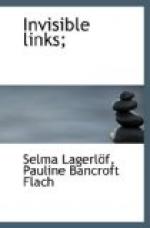One night, when the drifting snow whirled about the forest tops and drove into the thickest underbrush, the driving snowflakes found their way into the outlaws’ cave. Tord, who lay just inside the entrance, was, when he waked in the morning, covered by a melting snowdrift. A few days later he fell ill. His lungs wheezed, and when they were expanded to take in air, he felt excruciating pain. He kept up as long as his strength held out, but when one evening he leaned down to blow the fire, he fell over and remained lying.
Berg Rese came to him and told him to go to his bed. Tord moaned with pain and could not raise himself. Berg then thrust his arms under him and carried him there. But he felt as if he had got hold of a slimy snake; he had a taste in the mouth as if he had eaten the unholy horseflesh, it was so odious to him to touch the miserable thief.
He laid his own big bearskin over him and gave him water, more he could not do. Nor was it anything dangerous. Tord was soon well again. But through Berg’s being obliged to do his tasks and to be his servant, they had come nearer to one another. Tord dared to talk to him when he sat in the cave in the evening and cut arrow shafts.
“You are of a good race, Berg,” said Tord. “Your kinsmen are the richest in the valley. Your ancestors have served with kings and fought in their castles.”
“They have oftener fought with bands of rebels and done the kings great injury,” replied Berg Rese.
“Your ancestors gave great feasts at Christmas, and so did you, when you were at home. Hundreds of men and women could find a place to sit in your big house, which was already built before Saint Olof first gave the baptism here in Viken. You owned old silver vessels and great drinking-horns, which passed from man to man, filled with mead.”
Again Berg Rese had to look at the boy. He sat up with his legs hanging out of the bed and his head resting on his hands, with which he at the same time held back the wild masses of hair which would fall over his eyes. His face had become pale and delicate from the ravages of sickness. In his eyes fever still burned. He smiled at the pictures he conjured up: at the adorned house, at the silver vessels, at the guests in gala array and at Berg Rese, sitting in the seat of honor in the hall of his ancestors. The peasant thought that no one had ever looked at him with such shining, admiring eyes, or thought him so magnificent, arrayed in his festival clothes, as that boy thought him in the torn skin dress.
He was both touched and provoked. That miserable thief had no right to admire him.
“Were there no feasts in your house?” he asked.
Tord laughed. “Out there on the rocks with father and mother! Father is a wrecker and mother is a witch. No one will come to us.”
“Is your mother a witch?”
“She is,” answered Tord, quite untroubled. “In stormy weather she rides out on a seal to meet the ships over which the waves are washing, and those who are carried overboard are hers.”




